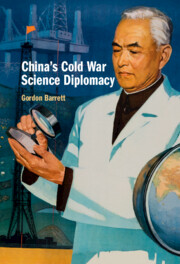Refine search
Actions for selected content:
2 results
Introduction
-
- Book:
- China's Cold War Science Diplomacy
- Published online:
- 18 August 2022
- Print publication:
- 25 August 2022, pp 1-22
-
- Chapter
- Export citation

China's Cold War Science Diplomacy
-
- Published online:
- 18 August 2022
- Print publication:
- 25 August 2022
